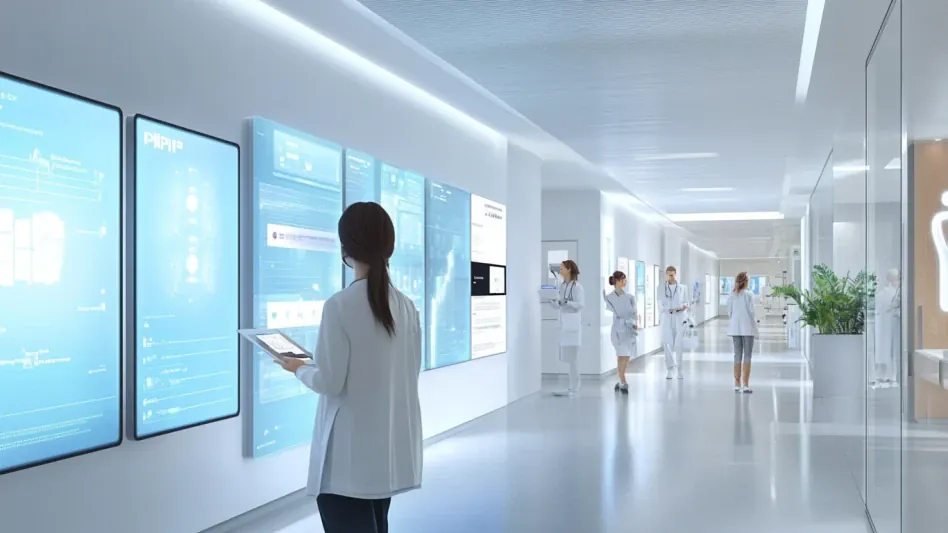In an era where healthcare faces significant challenges such as workforce shortages and the increasing prevalence of chronic diseases, Philips stands out as a beacon of technological innovation and clinical collaboration. Betsabeh Madani Hermann, Global Head of Research at Philips, recently showcased the company’s advanced technological solutions and commitment to revolutionizing healthcare at WebSummit Qatar 2025. Her discussion highlighted Philips’ strategic use of AI and predictive analytics to enhance diagnostic accuracy and therapeutic outcomes.
Pioneering Innovation in Healthcare
Driving Precision with AI and Predictive Analytics
Central to Philips’ innovation strategy is the integration of artificial intelligence (AI) and predictive analytics into medical technologies. These tools empower clinicians to make faster and more precise decisions, significantly improving diagnostic accuracy and therapeutic outcomes. The emphasis on AI-enabled imaging platforms, for instance, allows for earlier detection of conditions like cancer and stroke, which is crucial for effective treatment and saving lives.
AI and predictive analytics provide immense potential for the timely diagnosis and management of various health conditions. Through the application of these advanced tools, Philips has been able to develop sophisticated models that predict disease trajectories and recommend personalized treatment plans. These advancements allow healthcare professionals to offer more targeted and effective care, ultimately enhancing patient survival rates and quality of life. Additionally, leveraging vast amounts of data, AI systems continuously learn and improve, offering insights that might be missed by human observation alone.
Enhancing Access and Efficiency
Philips’ focus on technology aims to scale clinical expertise and improve access to care, addressing some of the most pressing challenges in contemporary healthcare. By implementing AI-enabled solutions, clinicians can better manage their workloads and streamline workflows. This not only improves patient outcomes but also alleviates the burden on healthcare professionals, thereby addressing issues related to workforce shortages.
New technologies introduced by Philips have played a pivotal role in bridging the gap between limited healthcare resources and increasing patient demands. For instance, the deployment of remote monitoring systems allows for continuous patient surveillance without the need for constant physical presence, thus maximizing the reach and impact of healthcare providers. Furthermore, automated systems for routine tasks free up valuable time for clinicians, enabling them to focus on more complex cases that require their expertise. This holistic approach ensures a more efficient healthcare system that can cater to a larger population with the same amount of resources.
Collaborative Innovation for Real-World Impact
Bridging Clinical and Technological Expertise
Philips brings clinical experts and technologists together from the outset of development projects to ensure new solutions meet real-world clinical needs. This collaboration leads to innovations that extend beyond AI-powered decision support to include automation in minimally invasive procedures and predictive analytics for personalized care. These advancements are pivotal in reducing clinician workloads and improving patient care efficiency.
By fostering an interdisciplinary approach, Philips ensures that innovations are not only technologically advanced but also clinically relevant. Collaborative efforts between medical professionals and engineers result in solutions that truly address the day-to-day challenges faced in clinical settings. Whether it’s through the development of smarter surgical robots or the creation of predictive models for disease outbreaks, the synergy between different expertise areas is the driving force behind meaningful and practical healthcare advancements. This focus on real-world applicability sets the stage for technologies that seamlessly integrate into existing workflows, ensuring smoother adoption and greater impact.
Dual-Track Exploratory Model
Philips employs a dual-track exploratory innovation model, where one track focuses on developing near-term solutions for existing clinical demands, and the other track, managed by breakthrough innovation teams, pursues long-term transformative projects. This structured approach ensures Philips can effectively address both immediate needs and future challenges, continuously advancing the quality and accessibility of healthcare.
This strategic model of simultaneous short-term and long-term innovation allows Philips to be agile and responsive while also positioning itself as a pioneer in healthcare technology. Near-term solutions, often developed through close feedback from clinical environments, ensure that pressing issues are dealt with promptly and effectively. On the other hand, long-term projects provide the groundwork for transformative changes that redefine how care is delivered. By balancing these two tracks, Philips maintains a leadership position in driving both incremental and radical healthcare improvements.
Commitment to Responsible Innovation
Proactive Risk Management
Under the leadership of Betsabeh, Philips prioritizes responsible innovation with a strong emphasis on patient safety and clinical accuracy. Philips Research uses pre-mortem exercises in every project, where teams proactively identify potential risks and envision failure scenarios before development begins. This proactive risk management approach helps in implementing preventative measures and refining decision-making processes, ensuring the reliability and trustworthiness of Philips’ technological solutions.
Patient safety remains at the core of Philips’ vision for innovation. By emphasizing proactive risk management, the company ensures that each new development undergoes rigorous scrutiny before reaching the clinical environment. This forward-thinking approach not only strengthens the reliability of Philips’ solutions but also builds trust among healthcare professionals and patients. Transparent and reflective innovation processes like pre-mortem exercises are key in fostering an environment where patient well-being and clinical excellence are paramount.
Cross-Sector Collaboration
In an era where the healthcare industry is grappling with significant challenges such as workforce shortages and the rising incidence of chronic diseases, Philips has emerged as a leader in technological innovation and clinical collaboration. Betsabeh Madani Hermann, the Global Head of Research at Philips, recently emphasized the company’s forefront role in healthcare transformation during her presentation at WebSummit Qatar 2025. She highlighted Philips’ strategic application of artificial intelligence and predictive analytics to improve diagnostic precision and therapeutic outcomes. This commitment to cutting-edge technology and clinical partnerships positions Philips as a pivotal player in the quest to address current and future healthcare demands. By leveraging advanced technologies, Philips aims to not only enhance the accuracy of diagnoses but also to ensure more effective treatment plans, ultimately contributing to better patient care and outcomes.









